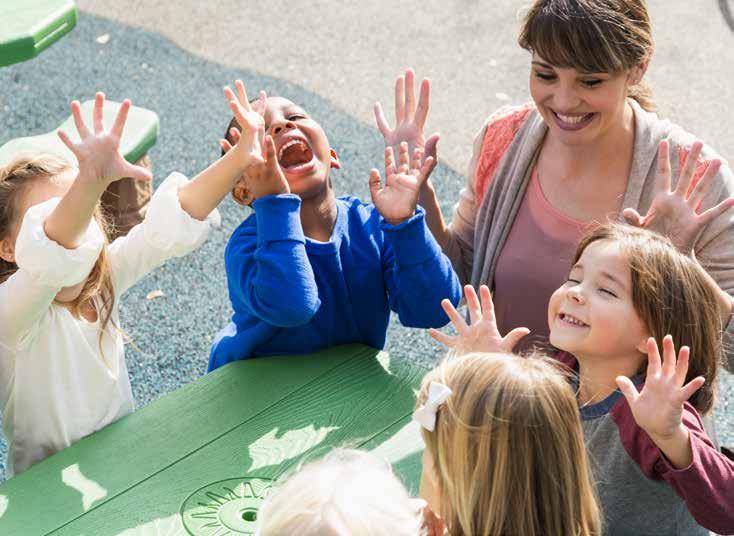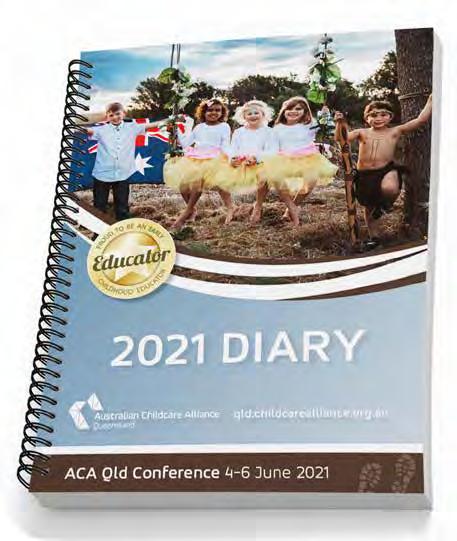
8 minute read
Why positive early childhood education is so important to me
Dr Shawna Lee > Academic
Canadian academic, Dr Shawna Lee, has spent many years researching child mental health, early education, and the links with the mental health of educators and family members. Here’s her story:
We’ve all heard those flippant comments about how fun or easy it must be to ‘be paid to play all day’ when we know that being an early childhood educator is hard work. Given that 90% of a child’s brain development happens by age 5, every single interaction with children has the power to influence the child forever. We are literally building brains! I didn’t plan to work in early childhood education. In fact, I studied to be an air traffic controller (a similarly fastpaced, high stress, extremely demanding role, where you can’t let your attention wander for a minute, because people’s lives are in your hands)! So what happened? Well, I had a son who didn’t quite fit into the box at school. He was ‘that child’…you know the one: labelled as “difficult”, because he couldn’t seem to settle in a classroom. And I was “that parent”: the one who said, over and over, “but I don’t understand - we don’t see these things at home.” And we didn’t. But we also didn’t have 30 children in our living room, so it was much easier to tailor our interactions with him in a way that supported him to behave completely differently. What I really wanted was for someone at the school to get to know him and treat him as a worthwhile individual instead of a “troublemaker”.
The final straw...and the turning point
I can remember the exact moment that I knew I needed to change my approach. I had said to the principal what I’d observed at home: “If you don’t mind me saying so, what we’ve found at home is that if he feels valued, and respected, he’s fantastic! He’s happy to do anything, he’s considerate, he’s cooperative. But when he doesn’t feel this way - if he feels cornered, rejected, or like he isn’t welcome – he reacts badly.” The principal looked at me witheringly and said: “Well if you don’t mind me saying so, I’ve been in this field longer than you have been alive, and I think I know what I’m doing, thank you”. I left the office, and I cried. And it hit me: nobody listened to you if you were “just a mother”. To be fair, I didn’t have relevant experience at that time. I just knew my son. But what if I did know more about child development, so that I could explain what I’d observed in language that educators would understand? And what if I could help advocate, not just for my son, but for all the other children like him?
Starting on a new journey
Working full-time and studying in the evenings, I completed my diploma in Early Childhood Education, then a Certificate in Inclusion Practices, a Bachelor’s Degree in Human Services, a Masters in Early Childhood Studies, and then a PhD in Educational Psychology. I worked as an educator in early learning classrooms and the K-12 school system, and an early childhood education and care program supervisor. My doctoral thesis won an award from the Canadian Association for Educational Psychology and I continue to conduct Early Childhood Education research around the world. I also delivered children’s mental health support through the largest children’s mental health agency in Ontario, Canada, then moved into service management. And I stuck with my goal: to better understand and support mental health needs in educational settings, while also working to break down the stigma around them.
But guess what I found out?
It wasn’t just my child who seemed to react badly to the standard educational environment. This turned out to be a recognised issue, where children who had atypical needs, social-emotional problems, mental health issues, ADHD, developmental delays, or some other related problem, were just not able to regulate themselves in the way other children were. What really shocked me was that educators weren’t really being prepared for this common scenario.
The key to a successful future... that not enough people talk about
Emotional well-being. Mental health. We know these are important – but why is it critical to think about these things in early learning environments? If we’re truly building brains, doesn’t that mean we should focus on academic performance? Well, yes, but quality early childhood experiences includes many things (e.g. child/ adult ratios, stimulating materials etc.), however ultimately the quality of the educator-child relationship provides the foundation for success, because: • Quality educator-child relationships provide a supportive environment that boosts emotional security and child confidence, even when difficulties arise • Quality educator-child relationships positively influence child behaviour Therefore, quality educator-child relationships offer a solid foundation for early learning environments that will best support children’s academic, mental health, and socialemotional development.
You could be “that person who cared about me”
Remember the wonderful, caring teacher in the Roald Dahl story Matilda? Researchers have found that highly sensitive educators may “buffer the effects of a negative family context for children who have insecure attachments with their mothers by reducing children’s risk for aggressive behaviour.”

In other words, if you’re that person who really helps a child who isn’t doing so well to understand their own worth, and to develop their skills and emotional selfregulation, you can help put them on a whole different life path. Incredible, right? So how do we create those high-quality educatorchild relationships: warm and respectful bi-directional interactions, strong emotional support, high levels of closeness and low levels of conflict…out there in the real world?
Why the children who need the most help don’t always get it
We’re not born with skills for reflecting on our own behaviour and stressors, and to understand how we may be accidentally contributing to a difficult interaction. When a child exhibits behaviours the educator finds challenging (such as disruptiveness, inattention, or aggression) and the educator doesn’t use effective strategies in response, this can put a real strain on everyone involved. Poorly trained or under-resourced educators may become frustrated with the children and engage in power struggles, negative reactions or even damaging behaviour. This can also lead to children being removed from programs, or staff experiencing burn-out and/or leaving their career all together. Of course, most educators who are highly stressed don’t engage in overtly negative interactions; however, they may become less engaged with the children in their class, have fewer individual interactions with children, or struggle to remain interested and responsive to each child’s particular needs. What’s really needed is more training and skill in child guidance techniques and in supporting socialemotional competency development for young children.
Looking after yourself, too Child mental health, in many ways, is linked to the
emotional well-being of the educator. If adults themselves are experiencing high levels of work or personal stress, it can be more difficult to be responsive to children. Educators who say they’re more stressed also report being less likely to use effective child guidance strategies, AND spending less time developing positive relationships with children who have behaviours they find challenging. Struggling with mental health and/or emotional well-being can get in the way of them understanding how that’s potentially affecting children’s behaviour and mental health. And then that may create tension between all the adults (educators, managers, and parents) involved.
This negative spiral can start to affect the overall quality of the early learning environment. In other words, it’s just as important to pay attention to educators’ mental health as to children’s. Prioritising everyone’s mental health - ours, too!
So as educators, we must begin prioritising our own mental health, and taking the time to care for ourselves, too. As a result, children will do better, too. Ensuring the right support and skills are available to everyone – including ourselves – should be a top priority. So, that’s how I ended up where I am now. My work led to researching the effectiveness of a new program, (PECE) through trials in Canada and other countries, which I’ve been doing since 2013. And that’s helping me achieve the goal that I’ve been striving towards for two decades: to improve the well-being and mental health of children and their care providers. And my son? He’s nearly 30, has a career he loves in the creative industries, does yoga and dotes on his cat, is incredibly calm and peaceful, has terrific communication skills…and like me, is an advocate for greater understanding of those who are a little “different”.
The Positive Early Childhood Education (PECE) program is an evidence-based online program for professionals working in early childhood education. www.peceprogram.net

Made by the sector, for the sector. ORDER YOUR COPY TODAY! The diary for all educators.
2021 Diary

• 27.6 cm x 19.8 cm, spiral bound • Monthly tabs • Monthly National Quality Standard checklists and reminders • State and Territory School Term Dates, public holidays • Yearly Planner • Plenty of writing space for notes, reflections, meetings, family feedback and more • National events and activities • Important contacts • Yearly reference calendars

Only $20 for members and $30 for others.
ACA Qld members must be signed in to the ACA Qld website to receive member rates.









